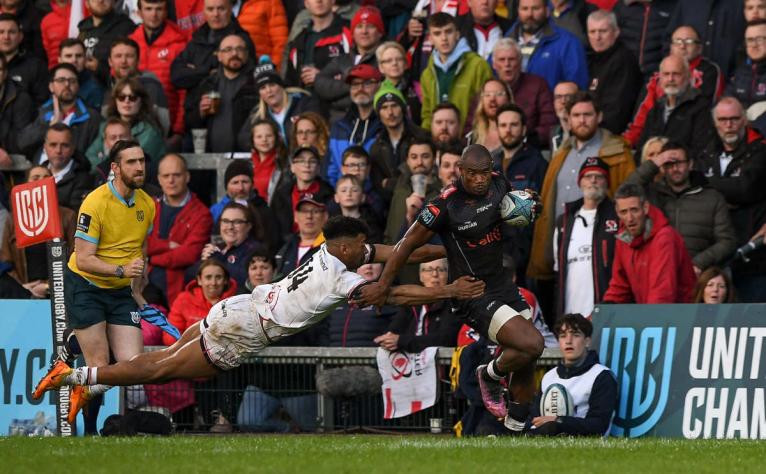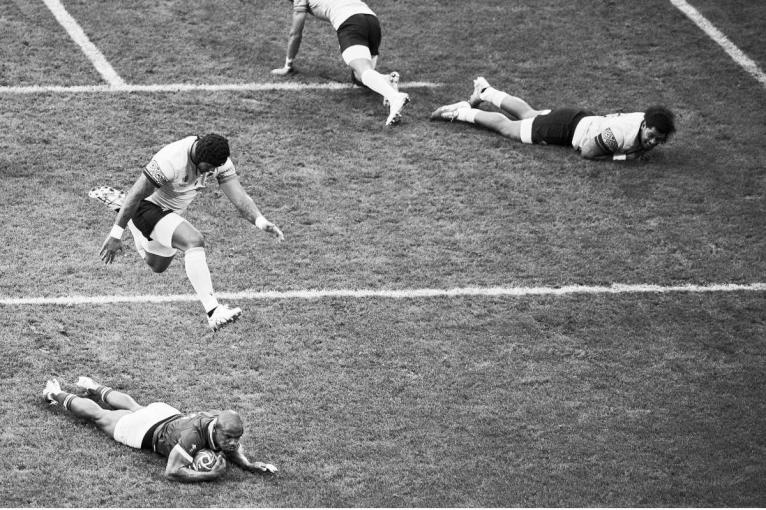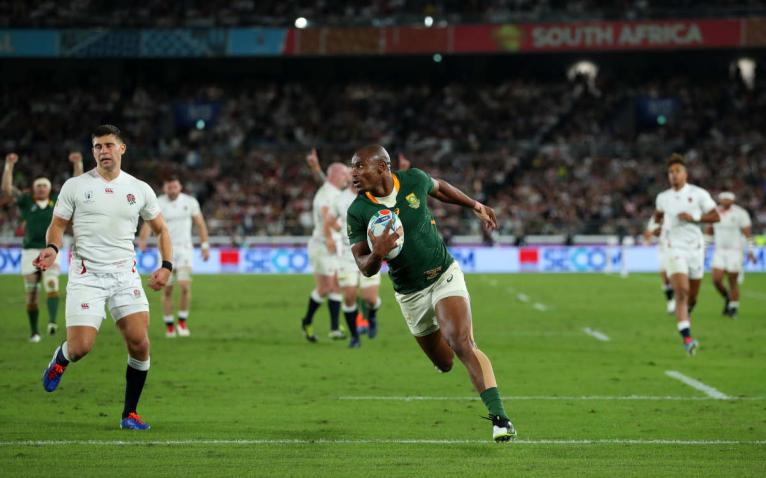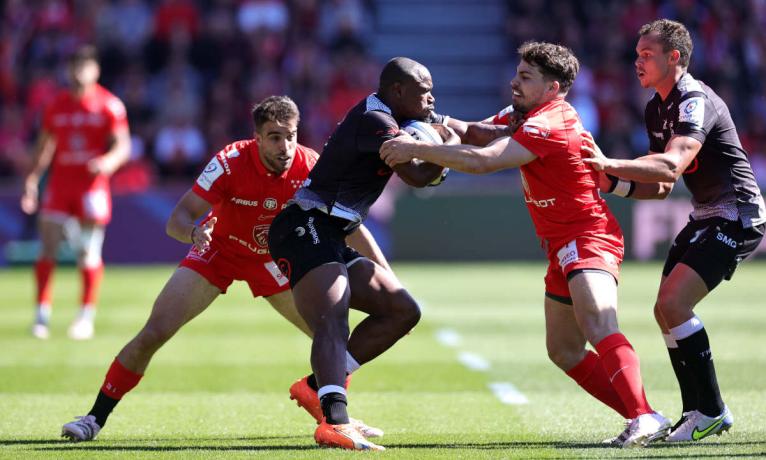When it comes to narrative arcs, there’s nothing as compelling as a rags to riches tale. And in the game of rugby, few stories can match the depths and peaks of the one belonging to Makazole Mapimpi.
Born into abject poverty, his mother died when he was 14, leaving him in the care of his grandmother, as his father had abandoned the family long before. Five years later his sister succumbed to an illness in her brain. Then his brother lost his life after he was electrocuted stealing electricity cables.
Now, two months shy of his 34rd birthday, he is a double World Cup winner, in possession of a British & Irish Lions tour winner’s medal, and an inspiration to millions.
“It’s a lot when I think about it sometimes,” he reflects. “Jeez, I think I can say that it’s a lot. My life is somewhere I never thought it would be.”
His journey is well documented. On the first Chasing the Sun documentary series, which chronicled the Springboks’ 2019 triumph, the late commentator Kaunda Ntunja described Mapimpi as the player who had come from the “most hopeless situation in the history of Springbok rugby.” A year later, a standalone film delved deeper into his life, exploring the pain and trauma he experienced as a child, the violence he witnessed, and the hunger he still remembers.
His is a story of South Africa in microcosm. According to the World Bank, approximately 55.5% of the population – roughly 30.3 million people – live below the breadline while a further 13.8 million people experience food poverty.

“When you’re from the rural villages, it’s hard to see yourself achieving big things,” Mapimpi told me in 2021 before the Lions series. “Everyone has dreams. But to actually believe deep down that you’ll achieve them is not something that feels natural. You have to tell yourself lies sometimes.”
This is not the Mapimpi story today. He carries himself with a confident swagger. He has presence as he gesticulates animatedly with his hands while speaking. Rugby has brought him fame and fortune and he’s enjoying the fruits of his labours. Few could blame him.
“I need to reward myself,” he says. “It’s important that I reward myself for what I’ve done. I also think people look at me and it’s important I look good. It’s not about the people, it’s about me, how I wear stuff.”
People sometimes just see the clothes and they can think this or that. But we all have different things we love. After rugby I’d even think about going into fashion. Maybe design or something. I’ve already started looking.
Expensive clothes are his not-so-guilty pleasure. His personal Instagram page is filled with images of himself posing in designer threads or flaunting his latest brand partnership. He’s an ambassador for Mercedes-Benz and has featured on the cover of GQ Magazine.
“I love fashion, man,” he explains, almost apologetically at first before doubling down with more authority. “I just love fashion. I have an eye for it. I grew up with nothing. I never had money to buy clothes that I wanted to wear. I would watch what other people were wearing and I said, ‘Okay, one day maybe I can dress like that’. So when I got money I’d look around [for inspiration], I started shopping around.”
“Some people tell me that I’m wasting money. They see me spending 10,000 Rand on something and think, ‘what’s going on here?’ But everyone is different. I’m not going to spend money on golf every Wednesday and Sunday. So I save. I actually sacrifice. People sometimes just see the clothes and they can think this or that. But we all have different things we love. After rugby I’d even think about going into fashion. Maybe design or something. I’ve already started looking.”

He admits that any indulgences carry a degree of self-reproach. This, he says, is a consequence of his upbringing, which is why he’s conscious to keep his feet on the ground.
“I go home [to the village of Tsholomnqa, in the rural Eastern Cape province] as much as possible,” he says. “I always get humbled. I see people who don’t have anything and I see myself. I see into people’s faces and they want to be me. But they’re also happy for me.
“When I go home I hang out with the guys who I used to hang out with before all of this. I need to understand people. You can take me any place around the world but I’ll always take myself back so I can keep my feet on the ground. I can’t take myself as a Springbok player. I have to feed on the situation around me. If you know yourself and keep the respect of people who don’t have what you have, then you can stay true.”
In November last year he donated 1.4 million Rand to his primary school and in 2022 established the Makazole Mapimpi Foundation which aims aims to solve identified social issues mainly affecting the youth, women and children
In November last year he donated 1.4 million Rand to his primary school and in 2022 established the Makazole Mapimpi Foundation which “aims aims to solve identified social issues mainly affecting the youth, women and children” and tackle gender based violence in South Africa. “Giving back lifts me up,” he adds. “I’ll always share what I’ve been blessed with.”
After his 2023 World Cup was cut short by a fractured cheekbone in South Africa’s last pool match against Tonga, Mapimpi flew home to recover as his teammates traversed the most challenging gauntlet ever faced to lift the Webb Ellis trophy.
While grocery shopping – “to buy food for the community, to make sure they could be happy, so they could have a nice braai” – supermarket workers began singing and dancing around him. In the middle of the adulation, and as his own name washed over him, Mapimpi cut an embarrassed figure, as if he was overwhelmed by the love he was receiving.

“People get excited when they see me, when they see a Springbok, and my life has changed, but I am still who I’ve always been, so it’s hard to explain,” he says, fumbling for the right words. “It’s like, how can I say this, it’s special. It’s just special. I don’t know what to say.
“People watched Chasing the Sun and maybe they were shocked because they didn’t know all of our stories. My story was one that people got to know. It was emotional. I think people could maybe see me and think, ‘I’m like that’.”
At one point during the second season of Chasing the Sun, head coach Rassie Erasmus spoke for millions of South Africans when he said, “We’re the only thing that fucking works in the country.” That’s not entirely accurate, but it’s not far from the truth.
When you lead people it’s not about you. If you’re there and you want to take control, then it’s the wrong attitude. It’s about people first. If the people are happy, if you’re making their lives better, then you’re doing your job.
With that in mind, many have wondered if this crop of Boks and their coaches could be persuaded to venture into politics once they’ve called time on their rugby careers. If anyone can fix the mess back home, surely it’s Siya Kolisi, Erasmus and the rest?
“We have different jobs,” Mapimpi offers. “What I will say is that some [political] leaders are doing it for themselves. When you lead people it’s not about you. If you’re there and you want to take control, then it’s the wrong attitude. It’s about people first. If the people are happy, if you’re making their lives better, then you’re doing your job. We lack that in our leaders in South Africa sometimes. I don’t think I can ever get into politics like that.”

Still, he has transcended his sport. And though he has no plans on retiring just yet, he is entering the final stages of his career. Has he contemplated how he’ll be remembered?
“I can’t eat legacy so I’m not worried,” he bats back. “I’m proud of what I’ve achieved, but what is a legacy? What does that actually mean? Even when I was playing club rugby I was worried that my career would suddenly be destroyed or I wouldn’t get anything, I didn’t want people to look at me and say I used to be something. When you work your legacy will be there. If people ask me how I’ll be remembered, I want them to say I worked for what I got. But I’m not alone. I’m not different. Anyone can achieve this.”



Comments
Join free and tell us what you really think!
Sign up for free